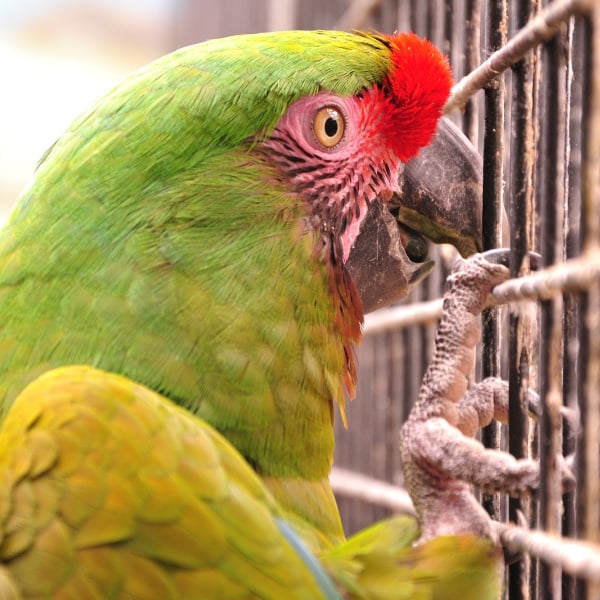
Do Birds in Cages Suffer All Their Lives?
Last Updated on by Mitch Rezman
Do birds in cages suffer all their lives?
Define suffer? If you don’t know any better how do you know you are suffering?
As good as our intentions are met by many things, they don’t necessarily meet our bird’s “instinctual expectations”.
Define a “cage”. If you talking about a big metal thing with bars that sits in your family room? In reality the entire home is a (bird) cage because the bird is not allowed to leave it unless it’s in a smaller travel cage
We make ourselves feel good by purchasing the most expensive cage money can buy. Ensure that their diet is organic and includes GMO free bird food pellets.
We clip their wings so they don’t fly into walls. We give them few alternatives to forage and expect them to understand the meaning of NO when they destroy a human possession.
We interact with them, when we’re not at work or driving carpool or at the gym or meeting with friends.
We don’t give our birds the opportunity to select a mate from dozens or perhaps hundreds in a real bird flock. They either get a mate that we choose for them, become your mate or the get dejected and have no mate at all.
So far that’s an oversimplification.
Birds been around for 100 to 200 million years depending upon available information
That’s a hell of a large instinctual footprint for a species. I think we don’t pay enough attention to our birds instinctual footprint.
In a recent post entitled Let’s start with forgetting that BIRDS DO NOT LIKE CHANGE! I make the point that we forget how fast bird’s process thought.
They can’t help it but they are hardwired to think three times faster than mammals.
Humans are awed by the speed of cheetahs. In one Google answer box the cheetah is listed as the fastest animal in the world with speeds (in short bursts) of 68 to 75 miles an hour.
Hawks fly horizontally at 40 MPH, literally without a worry of flying into a tree as they are able to “anticipate” the next “way out”
Peregrine Falcons have been clocked over 300 miles an hour in a dive.
This Goshawk video illustrates the adaptability of a bird in motion – while flying.
I’m an old guy but I still ride really fast motorcycles. My city ride is a 1977 Kawasaki KZ 1000. In that particular production year it was the fastest production motorbike made.
My country bike is a 2009 triumph rocket three with the biggest production engine made coming in at 2300 CC’s with the top end of 140 MPH.
I’ve seen 135 MPH but the speedometer was vibrating too much to get an accurate read.
https://www.youtube.com/watch?v=HKEuzxC4eGc
I recently had the opportunity to ride a Ducati Diavale for a couple of days click here for a video review
I can tell you unequivocally that my brain lags far behind the speed of the motorcycle.I am riding
In other words I’m suffering by not been able to accurately predict what’s going to happen traveling at approximately 150 ft./s (100 mph). Yet birds have the ability to calmly make certain assumptions about “what will happen next”
Perigrine falcons can see “a mouse at a mile”. To have absolute control over the captive animal it must be kept “hooded” when not in it’s mews (a birdhouse designed to house one or more birds of prey).
Is the bird suffering without sight? It’s a lot calmer. Is that a good thing?
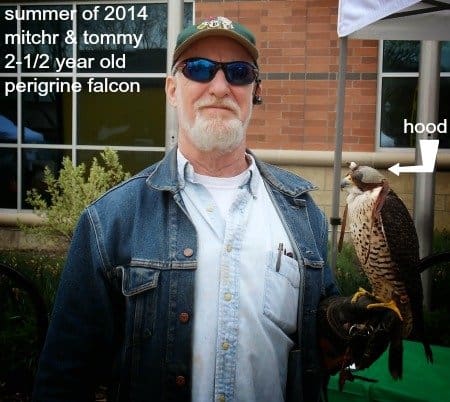
After World War II, Harvard professor BF skinner propsed that pigeons could be used for guided missile systems. ISYN (I sh*t you not)
My point is we bring these superb animals into our home, the ones that can blow ships out of the ocean, see a mouse at a mile and spend all their waking sunlit hours in the wild traveling across thousands of acres seeking food in dozens of secretive remembered areas.
Then we fear we will upset them by placing a new bird toy in their bird cage.
Then we fear we will upset them by placing a new bird toy in their bird cage.
That’s not a typo – I said that twice to make you really think about the cruelty you subject your bird to by not providing something new at least once daily if not all throughout the day.
“I don’t have the time to do all that”.
Really?
https://www.youtube.com/watch?v=AYrrnQoxfBM
We can’t leave the house in a major metropolitan area without a 12 pound backpack containing synthesized vitamin water, organic snack bars and enough electronics to control a small satellite
That bird in your cage can fend for itself in the wild for decades with nothing more than its feathers, beak and it’s zygodactyl feet.
Birds want and need to fly. Many humans feel they are better off with their wings clipped. This begs the question, does a bird who cannot fly but wants to – suffer?
Does a bird understand that its “wings are clipped”
Do they make the association when they lose their balance on a perch?
Do they make the association when they begin to preen the primary flight feathers but their tongue feels the rough edges of a cut feather shaft?
Birds seek variety that nature offers in terms of nutrition. Nuts, bugs, plants, fruit. Yet we insist on feeding them engineered food like zupreem parrot food pellets with each and every piece being the same size of the next and the last.
So we have to ask ourselves, if we are feeding our birds zupreem parrot food pellets because we think it is good for them but they are thoroughly bored with the consistent shape size and taste – are they suffering?
Peaches our Senegal parrot hates every human on the planet but me. We thought when we adopted her she would gravitate to Catherine, because the woman who ran the rescue that she spent the first seven years of her life, was a woman.
Peaches took to me immediately. I sprained my ankle two months after we got her and spent six weeks holed up in my bedroom 24/7 with my little green feathered companion.
That pretty much sealed the deal.
She is very unhappy when I am not around to directly engage with her.
I pet here every time we interact – I’ve not been bitten in 6 months
Thursday (10/19/17) a young couple came into the shop purchasing all the supplies they needed for their new four-year-old Quaker parrot.
Catherine was helping them out and introduced them to Peaches who was in her shop cage. She is always in a cage now because she is fully flighted and we can take no chances.
Even for the brief time that we take her out of the shop cage and place her into her travel cage, the front door gets locked so there are no accidents.
https://www.youtube.com/watch?v=GfHID6m4Aqw
Anyway there was a question that I needed to answer for the folks and when I came within a foot of Peaches cage, the positive disposition towards me changed so much that the young lady who is watching this exclaimed “only Gosh, I can’t believe how much she likes you – is that apparent”!
Does peaches suffer when I’m not around? I think so.
When humans break the law, we put them in cages.
When we bring our birds home to provide the best care possible, we put them in cages.
When the 4 budgies are home alone, I put on news radio for whiite noise. If I have to leave Peaches at home, she ends up listening to the news too.
https://www.youtube.com/watch?v=ZRG-i15zyU4
In that she likes to dance, she clearly likes music. Does she wish I would let Alexa play an endless shuffle of Van Morrison?
Are the droning news voices making her irritated. Does she ask herself “Why can’t I hear dancing sounds? This is just miserable”.
The folks in India have a very sharp opinion of keeping birds and cages
“CHANDIGARH: In what would come as a disappointment for bird lovers who have pet birds at home, the Animal Welfare Board of India (AWBI) has issued a circular against confining birds in cages.
Confirming the development, Jagdish Kochar, a city-based member of AWBI, said that a circular has been issued by the board for complete ban on keeping birds in cages, as it amounted to cruelty towards animals.
Kochar informed that the board has taken the decision after taking into account the decision of the Gujarat high court passed in May this year, that held that keeping birds in cages amounted to illegal confinement and was against the fundamental right of birds to move freely. Read more
We actually have several customers who buy our products and bringing them back with them to India in I was able to clarify this law with one of them.
As it stands now only the national bird the Indian ringneck, is for been to be kept as a pet bird. Thus the Indian bird markets are still thriving
Circling back to our domestic captive birds. Anyone who follows me, my writings and my rants knows how strong I feel about the quality and duration of light are birds are exposed to.
Light provides far more signals to birds than to mammals. We need light to see what were doing, so we can read and work on the computer.
We mammals have circadian rhythms. We get SAD in the winter because of the lack of sunlight.
Birds rely on sun light (and moon light) cycles to help determine when it’s time to breed, molt, migrate.
These are the same signals that birds have been receiving since the earth has been rotating around the sun.
Certain species select a mate by the invisible-to-human UV light a budgie can see in another budgies feathers
We bring them into our homes and put them by a big picture window, filled with sunlight that goes away it 6 PM starting in late October early November.
Most parrots are equatorial animals and expect 12 hours of sunlight and 12 hours of darkness.
All parrots have the ability to see UVA and UVB rays which are filtered out by that big picture window the bird cage is in front of.
So does always sending the wrong signals to our birds by not providing a 12 hours of light and 12 hours of darkness cycle stress them out contradicting their instinctual expectations?.
You betcha! That stress makes them suffer.
Would you want to move to Alaska where it’s dark for 67 straight days (nights) of winter?
We can help our birds overcome this with a simple lamp and a timer – raise your hand if you have a light cycle strategy for your captive bird.
I thought so.
I always catch a lot of flak especially in Facebook when you talk about how to hold the bird properly especially for medical care or wing and or nail trimming.
The methods I use were taught to me by veterinarians and bird behaviorist.
Regardless people talk about traumatizing the bird by restraining it. “I would never do that to my bird”.
But these birds live in our homes for decades (hopefully). To say they will never encounter a household accident is patently naïve.
A single encounter with some scotch tape or duct tape that clings to their feathers at 715 at night 15 minutes after your veterinarians office closes.
Because you refused to learn how to hold (towel) a bird and don’t know what to do to get this stuff off the bird without cutting feathers – your bird suffers even more.
The best strategy we can use is an holistic caged bird keeping strategy which means we look at everything
You can not buy “holistic” bird food or any holistic pet food for that matter. Somewhere at some point in time, the word “holistic” came to mean “healthy”.
Here’s the problem. “Holistic” is not a thing, it is multifaceted a point of view. No “thing” can be holistic – not a food – not a car – not a plant.
ho·lis·tic
hōˈlistik/Submit
adjective PHILOSOPHY
characterized by comprehension of the parts of something as intimately interconnected and explicable only by reference to the whole.
MEDICINE
characterized by the treatment of the whole person, taking into account mental and social factors, rather than just the physical symptoms of a disease.
now you know.
We advocate that you look at your bird(s) “holistically” meaning: nutrition – cage environment – lighting/light cycles – out of the cage environment – whether clipped or flighted – training – sexuality – species – foraging/enrichment opportunities – exercise – frequency of bathing – other feathered flock members – human flock members
We took them out of the sky. It’s time to step up and keep the suffering to a minimum
Written by Mitch Rezman
Approved by Catherine Tobsing
Author Profile
Latest entries
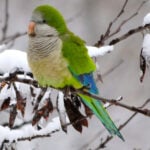 The Traveling BirdJune 26, 2025Can You Name 5 Parrot Species That Are Living Wild in the USA?
The Traveling BirdJune 26, 2025Can You Name 5 Parrot Species That Are Living Wild in the USA?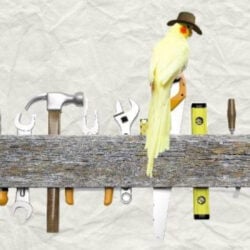 Bird BehaviorJune 26, 2025How is it Parrots Are Problem Solvers Social Animals and Even Use Tools?
Bird BehaviorJune 26, 2025How is it Parrots Are Problem Solvers Social Animals and Even Use Tools?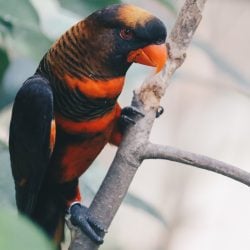 Bird & Parrot AnatomyJune 25, 2025How a Tiny Chemical Modification Makes Parrots Nature’s Living Paintings
Bird & Parrot AnatomyJune 25, 2025How a Tiny Chemical Modification Makes Parrots Nature’s Living Paintings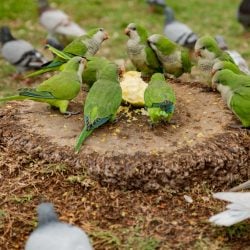 PigeonsJune 20, 2025How Do Parrots Thrive in Cities Outside Their Native Habitats?
PigeonsJune 20, 2025How Do Parrots Thrive in Cities Outside Their Native Habitats?

